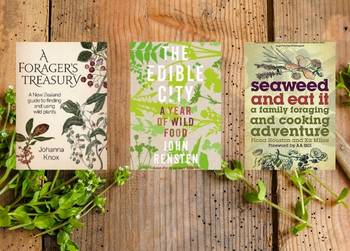So far, raumati (summer) in Wellington has been pretty idyllic. Hopefully, you’ve been able to get out and enjoy the outdoors, maybe by taking a dip in the surprisingly welcoming ocean or enjoying time in the garden with a good book. If you’re looking for a new outdoor activity, and are keen to explore around Wellington a bit more, foraging could be an ideal new hobby for you! Wellington has an array of forgeable foods growing all around the city, including mushrooms, koromiko flowers and dandelion!
Of course there are risks with foraging, you need to be confident in identifying plants before you eat them! We suggest first connecting with Wellington’s vibrant foraging community. There are plenty of supportive online communities, and professionally led courses you can attend to gain this required knowledge.
Our libraries also have a wealth of resources to help you in your foraging adventures! Below is a booklist to get you started. Happy foraging!
A forager’s treasury / Knox, Johanna
“Features profiles of many edible plants commonly found in New Zealand, including advice on where to find them, how to harvest them and how best to use them”–Back cover.” (Catalogue)
Find it, eat it : cooking foraged food gathered around New Zealand / Daly, Michael
“Divided according to edible weeds, food foraged from the fields, forest and seashore and a pantry section, Michael Daly provides recipes that demonstrate the use of wild foods in everyday cooking.”–Publisher information.” (Adapted from Catalogue)
A field guide to the native edible plants of New Zealand / Crowe, Andrew
“Over 190 trees, shrubs, herbs, ferns, mushrooms, lichens and seaweeds are described in detail in this useful and attractive book, with information on which part is edible and when, how plants have been utilised, particularly by Maori, their nutritional value, and where they can be found. In a separate section, Andrew Crowe also describes important poisonous plants that are native to New Zealand or are likely to be confused with the edible plants.” (Adapted from Catalogue)
Seaweed and eat it : a family foraging and cooking adventure / Houston, Fiona
“Part cookbook, part natural history guide, with tasty recipes, fascinating folklore and inspiring ideas for seasonal feasts, this book leads the reader through the process of identifying, learning about and cooking unusual and wild native foods.” (Catalogue)
The edible city : a year of wild food / Rensten, John
” In The Edible City, urban forager John Rensten gives us the tools to identify, source and cook delicious food from the year-long bounty around us, whether that’s winter cress and wild garlic soup, nettle and three-cornered leek gnocchi or stinging nettle tempura. This account of a year of urban foraging is perfect for the armchair enthusiast or home cook looking for exciting new ingredients to experiment with.” (Catalogue)
The thrifty forager / Fowler, Alys
“Fowler takes a fresh look at foraging, encouraging you to look closer to home, from the weeds in your garden to the trees in your street…Alys showcases her favourite edibles with a plant directory packed with useful information – photographic identification, plant description and tips on how to grow and how to eat it (including recipes such as fruit leathers and chutney) – that will give you the confidence to identify plants yourself.” (Adapted from Catalogue)
Food you can forage : edible plants to harvest, cook and enjoy / Francis, Tiffany
“An accessible and engaging guide to foraging for families and amateur naturalists.” (Catalogue)


